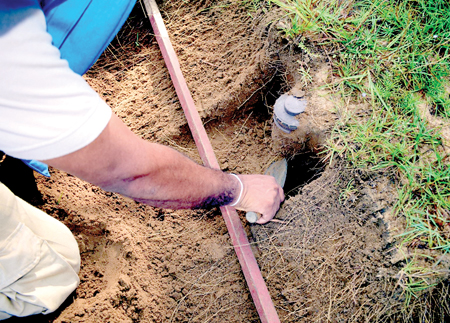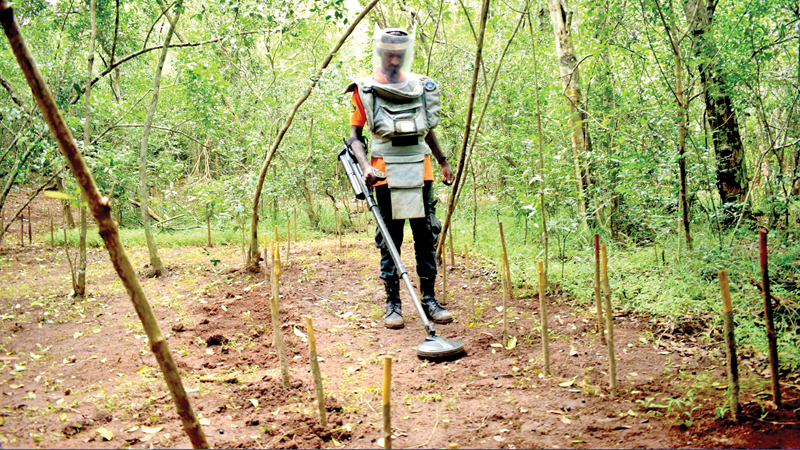Mines, explosive remnants of war, and improvised explosive devices continue to cause death and injury, especially in situations of armed conflict. On average, one person is killed or injured by such an explosive device every hour. Many children are among the victims. The use of improvised explosive devices has expanded, terrorising civilians and threatening humanitarian actors and United Nations missions and personnel.
The International Day for Mine Awareness and Assistance in Mine Action was commemorated on April 4 under the theme “Safe Futures Start Here.”
Building on the Pact of the Future, the United Nations mine action community stresses the need for funding micro and quick-impact projects to address urgent needs of persons with physical disabilities affected by conflict. This initiative reinforces the global commitment to civilian protection (Action 14) and to scaling up technology and innovation capacities in developing countries (Action 29).
From April 9 to 11, the United Nations Mine Action Service and the Geneva International Centre for Humanitarian Demining will co-host the 28th International Meeting of Mine Action National Directors and United Nations Advisers (NDM-UN28). This in-person meeting will bring together mine action leaders and experts to network and exchange views on pressing issues facing the sector.
Background
On December 8, 2005, the General Assembly declared that 4 April of each year shall be observed as the International Day for Mine Awareness and Assistance in Mine Action.
 It called for continued efforts by States, with the assistance of the United Nations and relevant organisations, to foster the establishment and development of national mine-action capacities in countries where mines and explosive remnants of war constitute a serious threat to the safety, health and lives of the civilian population, or an impediment to social and economic development at the national and local levels.
It called for continued efforts by States, with the assistance of the United Nations and relevant organisations, to foster the establishment and development of national mine-action capacities in countries where mines and explosive remnants of war constitute a serious threat to the safety, health and lives of the civilian population, or an impediment to social and economic development at the national and local levels.
For over 20 years, the work of the United Nations Mine Action Service (UNMAS) has been driven by the needs of affected people and tailored to the threat of explosive hazards faced by civilians, peacekeepers and humanitarians.
UNMAS works to save lives, to facilitate deployment of UN missions and the delivery of humanitarian assistance, to protect civilians, to support the voluntary return of the internally displaced and refugees, to enable humanitarian and recovery activities and to advocate for international humanitarian and human rights law.
History
The United Nations advocates for the universalisation of existing legal frameworks and encourages Member States to expand those regimes and develop new international instruments to protect civilians from the scourges of landmines and explosive remnants of war. It undertakes this work in collaboration with interested states, civil society, mine action and international organizations.
Since the Convention on the Prohibition of the Use, Stockpiling, Production and Transfer of Anti-Personnel Mines and on Their Destruction, commonly known as the Anti-Personnel Mine Ban Convention opened for signature in 1997, 164 countries have ratified or acceded to it. Advocacy by this unprecedented coalition raised public awareness of the impact of anti-personnel landmines on civilians and rallied global support for a total ban.
Article 6 of the Mine Ban Treaty provided for “victim assistance”, making the care, rehabilitation and the social and economic reintegration of victims of mines an obligation of States Parties to the Convention. It set out that this assistance must meet the immediate and long-term needs of mine accident survivors, their families, mine-affected communities and persons with disabilities.
The Convention on the Rights of Persons with Disabilities and its Optional Protocol (A/RES/61/106) was adopted on 13 December 2006 at the United Nations Headquarters in New York and was opened for signature on March 30, 2007. This Convention, which referred to the Mine Ban Convention, included all persons with disabilities. In addition to anti-personnel mines, challenges remain with respect to all other explosive remnants of war. On November 12, 2006, the Secretary-General welcomed the entry into force of Protocol V on explosive remnants of war from the Convention on Certain Conventional Weapons and reiterated his call for its universalisation and implementation. In December 2008, the Secretary-General welcomed the opening for signature of the Convention on Cluster Munitions, which was joined by 108 states.
Addressing the threat of explosive hazards
Guided by its inter-agency policy, the United Nations Inter-Agency Coordination Group on Mine Action (IACG-MA), consisting of 12 departments, agencies, funds and programmes, and with observer entities, such as the United Nations Institute for Disarmament Research and World Bank continue to ensure system-wide coherence in all mine action pillars and activities.
The United Nations Mine Action Strategy serves as an accountability framework for the United Nations system and participating entities, guiding efforts to prevent and address explosive ordnance threats during and after armed conflicts while supporting affected communities.
As agreed by IACG-MA Principals in June 2023, this Strategy will no longer be time-bound and will continue to be subject to periodic review every two years to coincide with the biennial report of the Secretary-General on assistance in mine action. The Principals of the IACG-MA endorsed the UN Strategy on December 13, 2023. The Strategy came into effect as of 1 January 2024.
The UN aims for a world free of landmines and explosive remnants of war, where individuals and communities live in a safe environment conducive to development and where the needs of victims are met. Twelve UN Departments and Offices of the Secretariat, specialised agencies, funds and programmes play a role in mine-action programs in 30 countries and three territories.
Mine action makes it possible for peacekeepers to carry out patrols, for humanitarian agencies to deliver assistance, and for ordinary citizens to live without the fear that a single misstep could cost them their lives.
Established in 1997, the United Nations Mine Action Service (UNMAS) works to eliminate the threat posed by mines, explosive remnants of war and improvised explosive devices by coordinating United Nations mine action, leading operational responses at the country level, and supporting the development of standards, policies and norms.
As a specialised service of the United Nations located within the Department of Peace Operations, UNMAS operates under UN legislative mandates of both the General Assembly and the Security Council. UNMAS also responds to specific requests for support from the UN Secretary-General or designated official.




